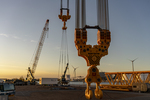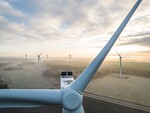11/29/2007
Ocean-going ships look to wind power
It's not just planes, trains and automobiles that are striving to be green. With the price of crude oil near $100 a barrel, the big cargo ships that are the lifeblood of global trade are looking once again at a free energy source — wind.
Companies are manufacturing kites the size of football fields that can be deployed with a flexible cable from the bows of huge vessels. Rising nearly 1,000 feet above sea level, they catch winds that are as much as 50 percent stronger than at the surface and help pull the behemoths along.
The kites are a throwback to a simpler era when ships relied mostly on wind. But these days they also address the very new-age worry of climate change. Proponents say kites, which let captains throttle back their ship's engines, will help slash fuel consumption by as much as 50 percent under optimal conditions.
Cutting back the amount of fuel burned also curbs emissions of greenhouse gases. By some estimates, the shipping industry discharges twice as much carbon dioxide as air traffic. One major player in the kite business, SkySails in Hamburg, Germany, initially developed kite-propulsion systems for luxury yachts in 2001. Today the systems are also being installed on cargo ships.
The first such ship to be outfitted with SkySails will be the 460-foot Beluga SkySails belonging to the Bremen, Germany-based shipping company, the Beluga Group. It's set to make its debut voyage Dec. 15, hauling windmills from Esbjerg, Denmark, to Houston.
Looking toward the future, SkySails is nothing if not ambitious. The company plans to have its kites ready for the general marketplace in 2008, with a goal of equipping 1,500 ships with kites by 2015. Stephan Wrage, founder of SkySails, came up with the idea of towing ships with kites at the age of 15. While being pulled along a beach, Wrage thought about alternative ways of using that immense power.
Later he studied industrial engineering and was an avid reader of books on climate change. "Starting from these considerations, he developed the idea to utilize this considerable potential for tugging ships," said Sonja Schreiner, a SkySails spokeswoman.
She said that depending on the prevailing wind conditions, a ship's average annual fuel consumption and emissions can be reduced by 10 percent to 35 percent by using the SkySails system, and even more if winds are optimal.
SkySails isn't the only company pioneering kite technology. KiteShip Corp. in Martinez, Calif., has been manufacturing ultra-large traction kites mostly for the private yachting sector, with plans to expand into cargo and cruise vessels.
Despite the burgeoning interest, John Barnes, editor of Marine Engineers Review, a magazine in London, said the jury's still out on kite propulsion systems. "This could work, but there is an extra cost entailed, and it won't make much sense if the price of fuel falls back," he said. "It seems to be a practical approach, but we still need to see what the benefits and penalties will be."
One hurdle is the costs associated with the hiring of crews to tend the kites. Another drawback: The system obviously won't work in a head wind. Barnes noted that there was also increasing interest in wind and other energy alternatives during the oil crisis of the late 1970s. "But then the prices fell down and the plans were shelved, so we'll have to see if the same thing happens this time," he said.
Schreiner said tougher restrictions on emissions leave the shipping industry no choice but to consider wind power. "This is especially the case in coastal areas frequented by cruise ships — the latest example being the United States — where more and more sanctions are being imposed to reduce emissions," she said.
Companies are manufacturing kites the size of football fields that can be deployed with a flexible cable from the bows of huge vessels. Rising nearly 1,000 feet above sea level, they catch winds that are as much as 50 percent stronger than at the surface and help pull the behemoths along.
The kites are a throwback to a simpler era when ships relied mostly on wind. But these days they also address the very new-age worry of climate change. Proponents say kites, which let captains throttle back their ship's engines, will help slash fuel consumption by as much as 50 percent under optimal conditions.
Cutting back the amount of fuel burned also curbs emissions of greenhouse gases. By some estimates, the shipping industry discharges twice as much carbon dioxide as air traffic. One major player in the kite business, SkySails in Hamburg, Germany, initially developed kite-propulsion systems for luxury yachts in 2001. Today the systems are also being installed on cargo ships.
The first such ship to be outfitted with SkySails will be the 460-foot Beluga SkySails belonging to the Bremen, Germany-based shipping company, the Beluga Group. It's set to make its debut voyage Dec. 15, hauling windmills from Esbjerg, Denmark, to Houston.
Looking toward the future, SkySails is nothing if not ambitious. The company plans to have its kites ready for the general marketplace in 2008, with a goal of equipping 1,500 ships with kites by 2015. Stephan Wrage, founder of SkySails, came up with the idea of towing ships with kites at the age of 15. While being pulled along a beach, Wrage thought about alternative ways of using that immense power.
Later he studied industrial engineering and was an avid reader of books on climate change. "Starting from these considerations, he developed the idea to utilize this considerable potential for tugging ships," said Sonja Schreiner, a SkySails spokeswoman.
She said that depending on the prevailing wind conditions, a ship's average annual fuel consumption and emissions can be reduced by 10 percent to 35 percent by using the SkySails system, and even more if winds are optimal.
SkySails isn't the only company pioneering kite technology. KiteShip Corp. in Martinez, Calif., has been manufacturing ultra-large traction kites mostly for the private yachting sector, with plans to expand into cargo and cruise vessels.
Despite the burgeoning interest, John Barnes, editor of Marine Engineers Review, a magazine in London, said the jury's still out on kite propulsion systems. "This could work, but there is an extra cost entailed, and it won't make much sense if the price of fuel falls back," he said. "It seems to be a practical approach, but we still need to see what the benefits and penalties will be."
One hurdle is the costs associated with the hiring of crews to tend the kites. Another drawback: The system obviously won't work in a head wind. Barnes noted that there was also increasing interest in wind and other energy alternatives during the oil crisis of the late 1970s. "But then the prices fell down and the plans were shelved, so we'll have to see if the same thing happens this time," he said.
Schreiner said tougher restrictions on emissions leave the shipping industry no choice but to consider wind power. "This is especially the case in coastal areas frequented by cruise ships — the latest example being the United States — where more and more sanctions are being imposed to reduce emissions," she said.
- Source:
- Online editorial www.windfair.net
- Author:
- Edited by Trevor Sievert, Online Editorial Journalist
- Email:
- press@windfair.net
- Link:
- www.windfair.net/...
- Keywords:
- wind energy, wind farm, renewable energy, wind power, wind turbine, rotorblade, offshore, onshore


























